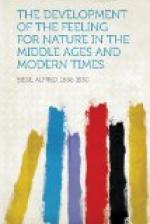[Footnote 12: Comp. Tagebucher und Briefe Goethe’s aus Italien an Frau von Stein und Herder. E. Schmidt, Weimar, 1886.]
[Footnote 13: Julian Schmidt.]
[Footnote 14: The Lady of the Lake breathes a delightful freshness, the very spirit of mountain and wood, free alike from the moral preaching of Wordsworth, and from the storms of passion.]
[Footnote 15: Laprade.]
[Footnote 16: ’Sa formule religieuse, c’est une question; sa pensee, c’est le doute ... l’artiste divinise chaque detail. Son pantheisme ne s’applique pas seulement a l’ensemble des choses; Dieu tout entier est reellement present poor lui dans chaque fragment de matiere dans le plus immonde animal ... c’est une religion aussi vieille que l’humanite decline; cela s’appelle purement et simplement le fetichisme.’ (Laprade.)]
[Footnote 17: Vorschule der AEsthetik. Compare ’With every genius a new Nature is created for us in the further unveiling of the old.’ 2 Aufi. Berlin Reimer, 1827.]
[Footnote 18: ’Like a lily softly swaying in the hushed air, so my being moves in its elements, in the charming dream of her.’ ’Our souls rush forward in colossal plans, like exulting streams rushing perpetually through mountain and forest.’ ’If the old mute rock of Fate did not stand opposing them, the waves of the heart would never foam so beautifully and become mind.’ ’There is a night in the soul which no gleam of starlight, not even dry wood, illuminates,’ etc.]
[Footnote 19: Comp. Tieck’s Biographie von Koepke. Brandes.]
[Footnote 20: Franz Sternbald, I. Berlin, 1798.]
[Footnote 21: Haym, Die romantische Schule. Berlin, 1870.]
[Footnote 22: Phantasus, i. Berlin, 1812.]
[Footnote 23: ’A young hunter was sitting in the heart of the mountains in a thoughtful mood beside his fowling-piece, while the noise of the water and the woods was sounding through the solitude ... it grew darker ... the birds of night began to shoot with fitful wing along their mazy courses ... unthinkingly he pulled a straggling root from the earth, and on the instant heard with affright a stifled moan underground, which winded downwards in doleful tones, and died plaintively away in the deep distance. The sound went through his inmost heart; it seized him as if he had unwittingly touched the wound, of which the dying frame of Nature was expiring in its agony.’ (Runenberg.)]




